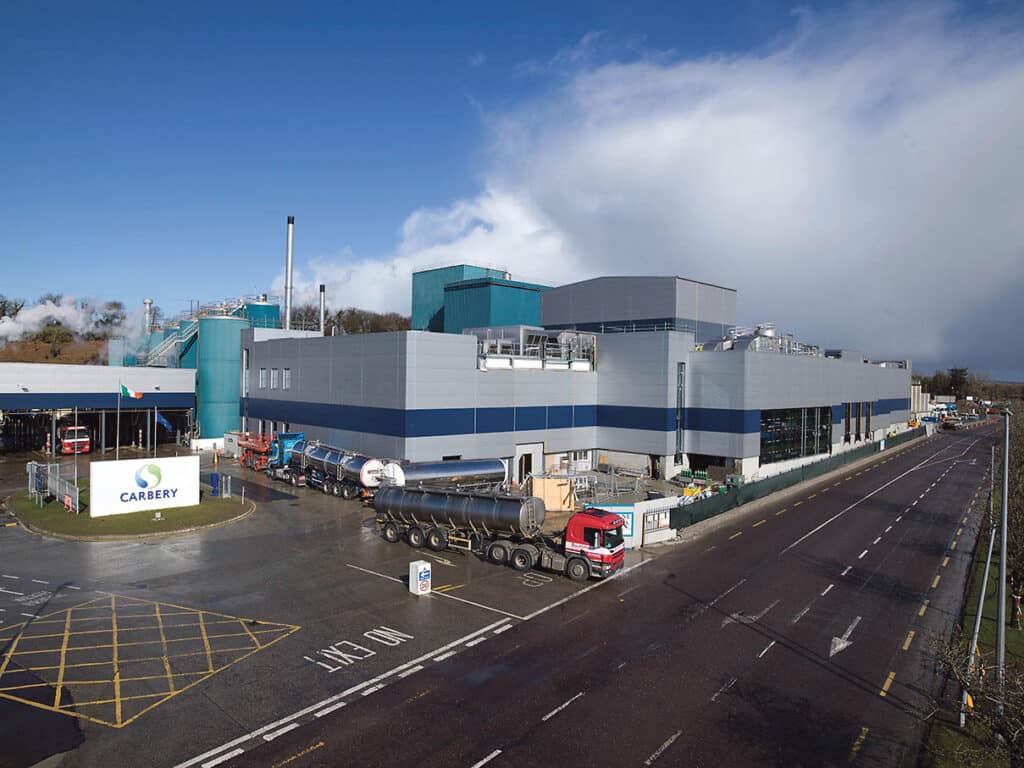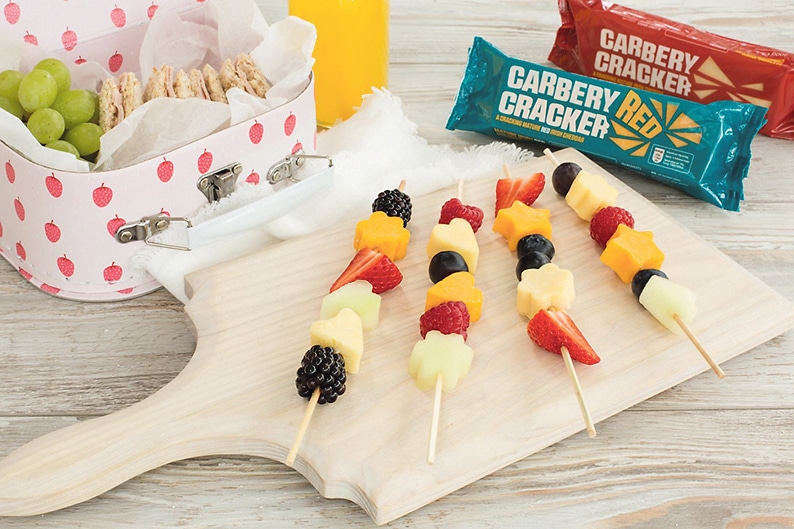Carbery was founded in 1965 as a joint venture between four creameries and Express Dairies, UK. Now fully owned by the four West Cork co-ops of Bandon, Barryroe, Drinagh and Lisavaird, the group has been proudly producing cheese, dairy and nutritional ingredients from its facility in Ballineen for over 50 years. Employing almost 300 people locally in West Cork, Carbery is embedded in the local community and takes its role as a major employer in the region seriously, whether that’s through supporting local organisations, or sourcing products and services locally.

What kind of relationship does the company have with local farmers?
As a co-operative, our relationship with our farmer suppliers is the most important one we have. We are owned by the four West Cork co-operatives, and we rely on our farmers to supply us with the best quality milk for our products. As a processor, we are committed to paying a fair price for milk, to supporting the sustainable success of the Irish family farm, and to finding and opening new markets for quality Irish products overseas.
What achievements are Carbery most proud of?
We are proud of all the products and ingredients that we produce, and in particular our award-winning cheeses, Dubliner and Carbery Cracker. From our base in West Cork we have grown to become a global company, with over 700 people located across the US, UK, Italy, Indonesia, Thailand, Brazil and Cork in our Carbery team. Our long tradition of innovation is also a source of pride. We have a global R&D team and we are known for being first to market with innovative and quality products in the dairy, nutrition and taste space. What we are proudest of is probably the way we do business. We are focused on growth and the success of the company, but we are also committed to doing this in a sustainable, responsible way. This has always been part of how we operate, but our decision to really prioritise sustainability in recent years has led to awards and recognition in this area, including Sustainability team of the year at the Green Awards 2020.
What sustainable practices are in place in the manufacturing process that add value to the milk and finished products?
Sustainability sits at the very heart of our business, ensuring the approach to our business and the communities in which we operate, are mutually beneficial for each other from a social, economic, and environmental perspective. We have integrated sustainability into our core business strategy because we believe it is the best way to drive it across the Group, as it is simply part of how we do business. The vast majority of milk supplied to us comes from within a 50km radius of the facility. Through our stability fund, our board has consistently supported the milk price paid to our shareholders during periods of dairy market difficulty to ensure their income is protected. One hundred percent of our suppliers are SDAS (Bord Bia’s Sustainable Dairy Assurance Scheme) approved. We are developing an Ethical Procurement Policy, which outlines our expectations on environmental, social and human rights aspects related to procurement. Since 2017, the carbon emission intensity per tonne of product made has reduced by 28.5 per cent at our Ballineen site.
We work sustainably in a whole range of ways but some of the best examples include:
• Against a backdrop of a 20 per cent increase in production in the eight manufacturing sites globally, the Group was able to achieve a reduction in carbon emissions of 11.7 per cent in 2019
• Since 2017, carbon emissions intensity per tonne of production has reduced by 28.5 per cent at Ballineen.
• Since 2018, electricity purchased has been 100 per cent from renewable sources through a green tariff.
• Our Every Drop Counts water programme has saved 1.4m litres of water per day in Ballineen
• The Carbery Greener Dairy Farms™ programme provides support to help farmers reduce energy use and carbon emissions. The 25 farms participating have reduced emissions by 15 per cent.
• In summer 2019, a small-scale grass bio-refinery was tested on five Carbery farms in West Cork – the first of its kind to be trialled in Ireland and one of the first in Europe.
• An Ethical Procurement policy which outlines expectations on environmental, social and human rights aspects related to procurement is being built into the contracts process.
• Ninety-five per cent of the paper and cardboard bought in Ballineen is certified sustainable
• From 2020, the Group will begin light-weighting plastic packaging and sourcing alternatives with a view to reducing the amount of plastic used by as much as 10 tonnes a year.
What products are manufactured at Carbery?
At our site in Ballineen we produce cheese, nutritional ingredients and dairy flavours. We supply our ingredients and flavours to brand owners, and they become part of well-known final products. Some of our products that customers would recognise on the shelves include Dubliner cheese, Carbery Cracker cheese and Carbery cheese. Our Dubliner cheese is supplied all over the world through Ornua. Dubliner cheese is exclusively made in Carbery, so no matter where in the world you see Dubliner cheese, it comes from Carbery. We are also starting mozzarella production this year. The new investment of €78 million in our cheese diversification project is in response to growing global demand for mozzarella, primarily driven by pizza consumption growth in Asian markets.

What is Carbery’s vision for the future of the company and of West Cork?
Our vision for the future of the company is to continue to grow responsibly and to expand our customer base geographically and into new market segments so that there is a reliable and attractive market for the products and ingredients produced from our farmer suppliers’ milk. We have facilities now in eight different countries, so we are working on embedding a cohesive, positive culture and connecting people across all our operations. Our cheese diversification project continues to be a major priority for us and a significant investment. We hope to be producing Mozzarella and opening new markets, particularly in Asia, for that product by the end of 2020.
For West Cork, we want to continue to be a substantial employer in the area and a contributing member of the business community and social fabric of the region. We donate to local charities every year with our partners SCAR (Skibbereen Charity Adventure Race) and we will continue to do this and hopefully to expand our corporate responsibility programme. Each year we employ graduates and students who are a great contribution to the team and we will continue to do this and to expand our graduate programme. We want to build on our strong reputation for innovation both in our products and in how we do business.
What kind of impact has Covid-19 had on the group?
Since the outbreak of the Covid-19 crisis, our priorities have been to ensure the safety and wellbeing of our staff, and to ensure we can maintain production so we can continue to accept milk throughout peak season from our farmers, and continue to deliver for our customers. We put several measures in place to minimise the spread of the virus. These include:
• Stopping all business travel
• Facilitating as many employees as possible to work from home
• Creating alternative office locations where possible
• Avoidance of in person meetings
• Strict implementation of two metre social distancing rules
• Regularly sanitising work stations and high traffic areas
• Visitors who are not business critical are no longer permitted on site
• Shifts have been staggered to minimise contact between people on different shifts.
What type of challenges as a result of the pandemic does Carbery foresee?
We are very aware that the Covid-19 crisis and some of the measures that we have had to implement mean that our employees are working in stressful and sometimes not ideal circumstances, both those groups that continue to come to work to ensure production and those working at home, juggling work and childcare obligations.
As we try to bring people back to work, in line with government guidance, we will have to ensure the continuation of social distancing and other preventative measures, like other companies.
The crisis created strong demand for our products across retail, but the collapse of the food service business globally did have some implications for us, and the instability of global markets impacted the price we paid to our farmer suppliers for April and May. We do continue to support milk price from our stability fund. Medium-term, we are hopeful that the Group is in a strong position to weather the impact and hope to get back on track within the next year.
Will the production of mozzarella go ahead as planned in August?
Covid-19 has created issues with the availability of critical technicians to complete the project and so we have decided to delay the Mozzarella project. We will re-engage the technical support engineers required to finish the plant once the pandemic has subsided and continue with commissioning the new line, and we hope to be supplying product by the end of this year.
Has the group’s focus globally now changed?
We have a major focus on ensuring employee wellbeing and safety, and on maintaining the standard and supply of high-quality products and ingredients for our customers, but these have always been high priorities for us. Globally as a group we have also been supporting front-line workers and local businesses to play our part in boosting local economies and suppliers. Our cheese diversification project continues to be a key priority for us, especially given the lack of resolution to the Brexit process. Our global goals and strategy remain the same, albeit with adjusted timeframes now due to Covid.
In 2012, the Group launched the Greener Dairy Farms initiative and aims to be carbon neutral by 2035. Can you tell me about this? What are Carbery’s future environmental commitments?
It’s our vision to create a better future for our farmer shareholders and those who are affected directly and indirectly by our business including out colleagues, suppliers, customers, communities and consumers. Some of our future plans include:
• Becoming carbon neutral by 2035 across all sites by decarbonising our existing energy sources
• We aspire to be a zero waste organisation, by improving segregation of waste streams and the use of recycling, composting and anaerobic digestion
• We have 36 farmers enrolled in the ASSAP (Agriculture Sustainability Support and Advisory programme) which last year achieved a 17 per cent improvement in water quality across targeted areas. We want to increase participation in this.
• We are currently working with a number of partners to develop a zero emission/carbon neutral dairy farm at Shinagh Estates, owned by the four West Cork co-ops. The project is called Farm
Zero C.
How many parts of the world enjoy a taste of West Cork through Carbery’s products?
Carbery Group products are supplied to and enjoyed in over 50 countries worldwide, across all age groups from infants to active and ageing adults!



